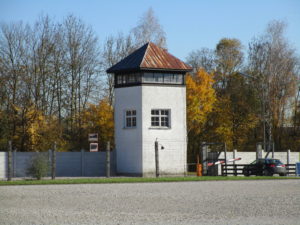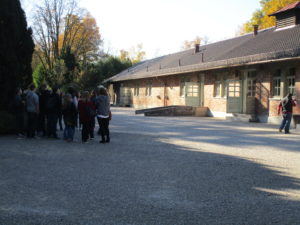Why should I visit Dachau Concentration Camp Memorial Site

Something you have to do in Munich!

During my 14 years directing tours at Dachau I have noticed something that happens often. Guests on my tours remark that they have left their travel companions, be it friends or family to do something else for the day. “They thought it would be too depressing” is the reason that I often hear. One can understand people being reticent, Dachau is a very confronting place and people want to have a good time on their travels. There are many fun things to do in Munich for sure and my busiest time of the year is during Oktoberfest, when millions of people flock to Munich to indulge themselves with copious amounts of alcohol and to generally have a great time. The question has to be asked though, is there a tangible moral human obligation to take the time out and visit Dachau, or any of the other memorial sites in Europe and learn about places that represent the worst excesses of human brutality?
Germany as a nation certainly takes this responsibility very seriously, 8th grade students have to visit a memorial as part of their education and they have time in their curriculum allocated for study of the subject. That is part of the collective German responsibility for dealing with a period in their history, which is still a source of guilt and shame. That has to be commended, as not all nations take such extensive responsibility. In the big picture however, is it really just Germany that should be saddled with that responsibility? Should there not be a collective human responsibility? Human history is littered with examples of mans cruelty to man, the first concentration camps were instigated by the British during the 2nd Anglo/Boer war(1899-1902). The British initiated a “scorched earth” policy to try and drive out guerrilla insurgence during the latter part of the conflict. They had already set up concentration camps earlier, to act as refugee camps for displaced civilians, mainly women and children. Due to this policy the camps rapidly became terribly overcrowded and disease was killing tens of thousands of people. So the concept of the concentration camp was started by the British. Germany did have a role to play in Africa as well, Namibia was part of a smaller German empire in South West Africa where concentration camps were set up(1904-1908) to incarcerate Herero and Namaqua men, women and children. Although labelled as prisoner of war camps by the Germans, historians have subsequently described them as death camps and as an act of genocide against these people.

The history of genocide is also not something unique to Germany,the Mongol genocides under Genghis Khan, the Armenian massacres during the Ottoman Empire and very recently in Rwanda and the old Yugoslavia. Indeed human history sadly is a legacy of war, persecution and genocide. So maybe the answer to the original question”why should I visit Dachau Concentration Camp Memorial site” becomes a little clearer, we have to take a collective human responsibility. As Nelson Mandela opined “Education is the most powerful weapon you can use to change the world”
Dachau today serves first and foremost as a memorial to those that lost their lives and to those subjected to a life of suffering because of the conditions they were exposed to. It is also a place of education and reflection, the idea being that we visit, inform ourselves about what happened, and leave with a collective determination to stop such atrocities in the future. Maybe then, we should take the time to convince our travel companions that they should think twice about deciding to avoid Dachau. My goal as a tour guide is to present the information in such a way that the visitor leaves wanting to inform themselves further. I always suggest reading a book by a survivor of the specific memorial visited as this personalizes the experience more and gives us a deeper connection with the victims.
It is also important that people go away reflecting on the perpetrators of the crimes, the deaths head division of the SS who ran the camps. What manner of man or indeed women in some cases were they? Repeatedly, I experience my guests being perplexed by what they did and how easily they seemed to do it. They often ask “were they psychopaths”? or “you can not be right in the head and do those things”? According to research it seems that very few of the perpetrators did have such issues. In his excellent book “Dachau and the SS a schooling in violence” British historian Christopher Dillon, having done extensive research estimates that fewer than 5% of them would have had mental issues.
We have learned from psychological experiments undertaken since the end of the war, such as the Milgram experiment at Yale University and the Stanford prison experiment, that human beings are extremely malleable and vulnerable to authority. It seems that generally we tend to follow the path of least resistance and are only too willing to pass our moral compass on to a perceived higher authority. However as Milgram discovered in his experiment, there is always a smaller percentage of people who refuse to follow the herd and will stoically adhere to their perception of right from wrong. Ironically it was people with that inner resolve who were the first victims at Dachau, the Nazis opened Dachau to suppress any resistance to their regime, people who questioned their direction or were not congruent with them politically. Maybe had more of the general population questioned and taken action based upon their suspicions, the regime would not have consolidated the vice like grip it eventually had on Germany. Most historians concur that the Nazi regime was at its most vulnerable in the early days of its tenure, that would have been the time to strike. Maybe if the civil population of Germany had been better informed about their own vulnerability, they would have been in a better position collectively to take action. That is why it is so important to visit Dachau, to pay respect to the victims and to make sure their sufferance was not in vain. To inform and educate ourselves so that we can take responsibility for ourselves and others. To make sure that the legacy of Dachau is not in vain.